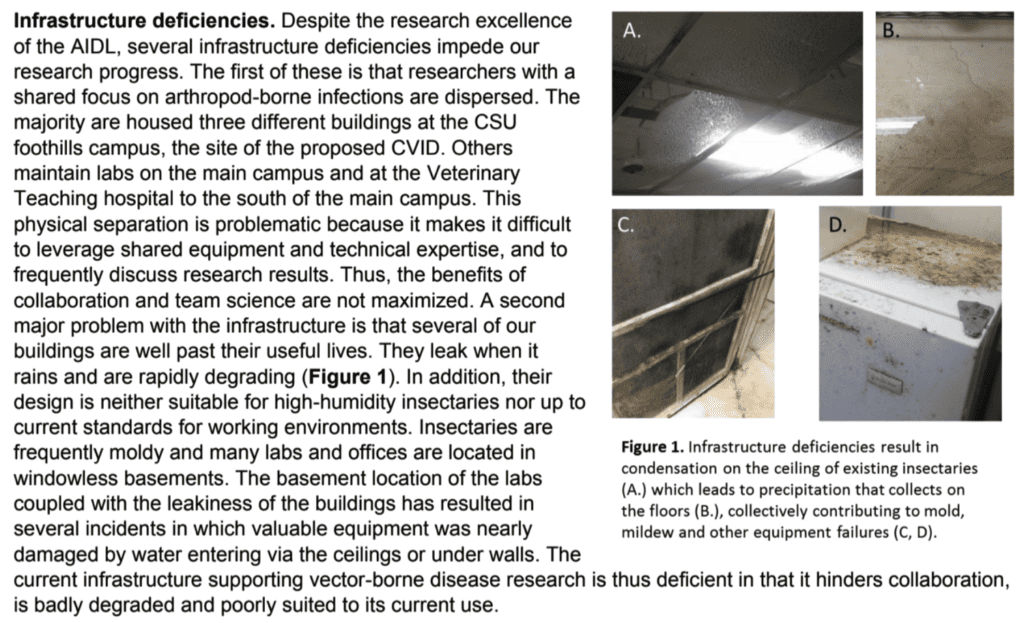A draft funding proposal for the construction of a new biolab at Colorado State University raises questions about safety and security at its existing biolabs in Fort Collins, Colorado.
The draft proposal seeks funding from the National Institutes of Health to replace “aging” infrastructure within CSU’s Center for Vector-Borne Infectious Diseases, formerly known as the Arthropod-borne and Infectious Disease Laboratory (AIDL). The center rears insect and bat colonies for infectious disease experiments with dangerous pathogens such as SARS, Zika, Nipah and Hendra viruses. Live-pathogen experiments there are performed in part in BSL-3 facilities, which are air-tight laboratories with special technologies to prevent researchers from getting infected and spreading infections.
The proposal’s authors (Tony Schountz and Greg Ebel from CSU and Jonathan Epstein, a vice president at EcoHealth Alliance) write that, “several of our buildings are well past their useful lives.”They attach pictures of accumulating mold and mildew as proof of “rapidly degrading” facilities that “leak when it rains.”
The proposal also explains that the lab’s existing design requires cell samples of infected bats and insects to “be transported to different buildings prior to use.” It states that the existing autoclaves, which sterilize biohazardous materials, “frequently malfunction and there is a legitimate concern they will continue to do so.”
It is possible the troubles are overstated because they support a funding request. Here is an excerpt from the funding proposal with the images.
The proposal raises several questions: Are human lives at risk from AIDL’s faulty equipment and infrastructure? Does this decrepitude increase the likelihood of an accidental leak of dangerous pathogens? Are there other EcoHealth Alliance-affiliated facilities around the world that are similarly degraded and unsafe? Were the conditions similarly unsafe, for example, the EcoHealth Alliance-funded Wuhan Institute of Virology? That institute has been identified as a possible source of SARS-CoV-2, the virus that causes Covid-19.
Records of CSU’s institutional biosafety committee (IBC), obtained via public records request, seem to reinforce concerns about safety of CSU biolabs. For example, meeting minutes from May 2020 indicate that a CSU researcher acquired Zika virus infection and symptoms after manipulating experimentally infected mosquitoes. The IBC noted: “Most likely this was a mosquito bite that went undetected during a chaotic time due to COVID-19 shut downs and changes.”
Ironically, increased infectious disease research on SARS-CoV-2 may have heightened the risk of biosafety lapses and mishaps at CSU. The IBC minutes express support for “concerns raised regarding the large number of research projects involving SARS-CoV-2 which has put strains on resources such as PPE, lab space, and personnel.”
If you would like to receive regular updates about our biohazards investigation, you can sign up for our weekly newsletter here.
Written by Sainath Suryanarayanan










